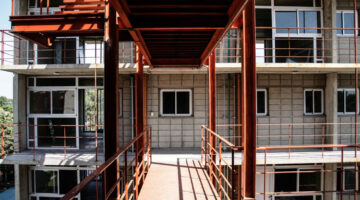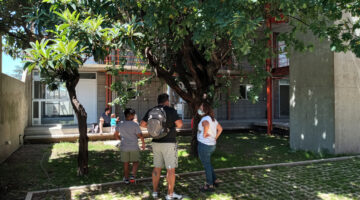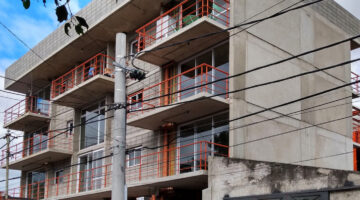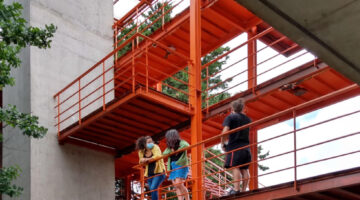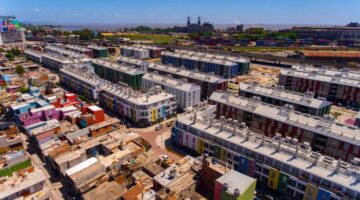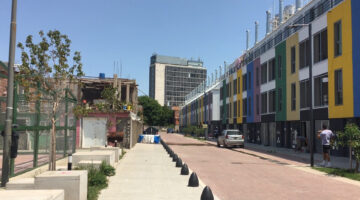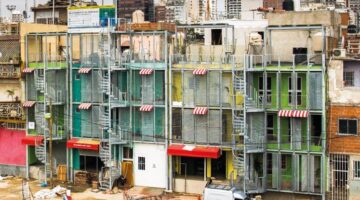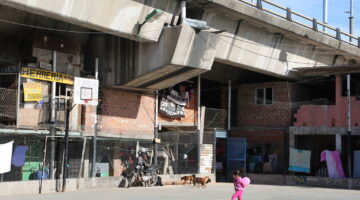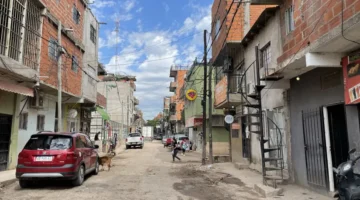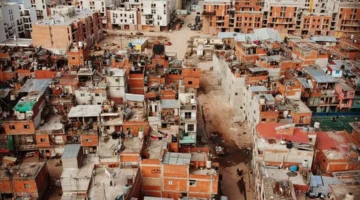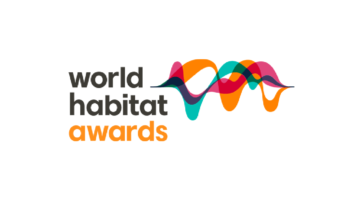Over the last 20 years, Fundación Pro Vivienda Social (Social Housing Foundation – FPVS) has worked to improve living conditions in Greater Buenos Aires, by promoting social inclusion, empowering communities, improving housing conditions and connecting them to basic services. Since 2010, FPVS has been implementing the Community Development Plan (CDP) in all the communities where it works, giving a holistic vision and an increasingly important role to residents in the development of their communities. Three strategies have been defined to carry out the CDP: community empowerment, design and implementation of innovative projects and promotion of pro-poor businesses, with five programmes running to date, namely the Integral Gasification Project, Housing Improvement and Young Builders Project, Community Education Centre (CEC), Neighbourhood Development Observatory and Inclusive Business Park.
Project Description
Aims and Objectives
The mission of FPVS is to provide long-term, community-led solutions to the habitat problems facing low-income neighbourhoods. This participatory model relies on the active collaboration of residents, companies, banks and governments, and its central objective is to promote community development. The model aims to stimulate community life and civic participation, social capital, affordable access to goods and services, household budgets and savings.
Context
Rapid, unplanned urbanisation has given rise to alarming inequalities and housing deficits across Latin America. In Argentina, more than five million families rely on government action to gain access to services, but public policy has failed to meet their needs, leaving the process of urbanisation in the hands of local residents. In Greater Buenos Aires, over six million people live in poverty with limited or no access to basic services or affordable adequate housing. This, combined with a culture of distrust and disinterest among banks and companies, has led to financial exclusion and social marginalisation of millions of people.
The municipality of Moreno is characterised by processes of self-construction, high levels of informality and unemployment, lack of infrastructure and little or no access to basic and financial services. Only 19 per cent of the population has access to drainage, 41 per cent to potable water, 32 per cent to the natural gas network, 45 per cent of families live in precarious housing conditions.
Key features
The Project is being implemented in 18 marginalised neighbourhoods in the municipality of Moreno, in Greater Buenos Aires. It promotes social inclusion by empowering communities, improving housing conditions and connecting them to basic services. FPVS acts as a facilitator, promoting a model in which residents and a range of actors work together to achieve a common goal. Links and partnerships have been formed with public and private entities at local, national and international levels, which include financers and donors, government (at various levels), international organisations, technical support intermediaries, and research and academic bodies.
Community empowerment: FPVS trains local community members as Community Developers to work in areas of promotion, conflict resolution, administration, communication and computer science, generating social capital. Additionally, the Young Builders’ Project trains students from local technical school in construction and provides practical experience through internships and professional experience.
Housing improvement and gas supply: The Neighbourhood Trust Funds (NTFs) are used as a platform that provides a collective guarantee, ensures transparency and reduces the risk involved for investors. The NTFs act as savings and credit schemes, with initial funds provided by donations, which the FPVS has sought specifically for this purpose, acting as a collective guarantee for lenders. The model requires more than 60 per cent of residents to sign up to participate in the programme to make viable, who start repaying the loan once the service is provided. As part of the Integral Gasification Project, five NTFs have been set up to date (one for housing improvement and four gasification funds), bringing together 16,000 families from which 4,500 have already been connected to the natural gas network. The NTF set up for housing improvement serves all families participating in the gasification projects, to facilitate housing improvements and make better use of the new gas connection. The beneficiaries typically use them to purchase gas appliances such as hot water systems, ovens and heaters.
The model consists of a series of steps:
- Residents are trained to participate in the projects as Community Developers, who promote the programmes in their blocks. Community organisation is consolidated via the establishment of NTFs.
- A financial and technical plan is created for each household based on individual family needs. Later, a single proposal is made to the bank on behalf of thousands of residents, taking into account their diverse financial capacities.
- The financers accept the collective guarantee offered by the community – this includes an additional sum (18 per cent) paid by residents to the bank until the works are completed (a contingency fund), which is returned to the community via NTFs.
- After the works are carried out, the residents repay their loans at the pace they can afford (over a maximum period of 72 months).
- Once the lenders have been repaid, the residents determine how they would like to reinvest the contingency fund into the community to further improve neighbourhoods with e.g. drainage, pavements, street lighting, or community centres.
Promotion of pro-poor markets: FPVS acts as a mediator, connecting demand for services and credit in low-income communities with goods and services from companies (bank, gas providers, etc.) which are apprehensive about working with these sectors, aiming to stimulate fair, inclusive and responsible business practices.
Covering costs
- FPVS relies on operational and institutional revenue to carry out its work. Operational revenue is obtained from the fees attached to the services to the NTFs and the administration of funding for the ‘Mejor Vivir’ programme (from the national government). Institutional revenue is sourced from open donations and project funding provided by the IADB (Inter-American Development Bank) and IAF (Inter-American Foundation).
- Collaboration is promoted between companies, governments, local suppliers and residents as well as with local and international banks. More than US$5 million has been sourced from diverse investors, including resident’s contributions (36 per cent), Multilateral Investment Fund – MIF – (22 per cent), service providers (5 per cent), commercial credits (19 per cent), public subsidies (11 per cent) and FPVS (7 per cent).
- The NTFs are established with initial funds provided by donations through FPVS.
- The current, standard price of a household natural gas network connection is US$1,680. The average home improvement loan is US$340.
- The current loan interest rate is 39 per cent. Given the high inflation rate (25 per cent), the actual rate is 14 per cent per year. Given the long period given to repay the loans (up to 72 months) and the small size of the instalments, the majority of families are able to repay the loans with little or no impact on the household budget. On average, residents take approximately 40 months to repay loans. The monthly repayment is made via the gas bill, and despite the payment, families increase their disposable income by five per cent per month due to reduced energy costs.
Impact
- As per 2013, 16,000 families participate in five NTFs, of which 4,500 have already been connected to the natural gas network, having a positive impact on the health, quality of life and comfort for approximately 20,000 people in 18 neighbourhoods.
- 8,500 micro-credit loans and technical construction support have been given to improve housing conditions of families.
- Alliances have been formed with local grassroots organisations and international bodies.
- 300 Community Developers have gained new skills, and 30 Young Builders have been trained to date.
- Households with natural gas increased their disposable incomes due to reduced energy costs (five per cent on average) and home values increased (between 15 and 20 per cent), as a result of the improvements undertaken.
- Communities are empowered and organised, and continue to make improvements on their living environment once the initial works are finished.
- By acting as a nexus between the communities and service providers, the FPVS has an impact on the access of these sectors, which changed from being considered ‘high risk’ to viable clients for the companies serving them.
Why is it innovative?
- Community trusts and innovative finance mechanisms are used to manage resources and deliver the project, using housing as a mobilising agent through which the community gets together to combine savings and resources, which it has pioneered in Argentina. The financial model offers a diverse range of plans, with high repayment rates.
- Neighbourhood Committees and working groups are formed within and across neighbourhoods, and partnerships have been established with a number of actors. The project works on the basis of consensus and inclusion and all decisions are taken through a participatory process, with communities playing a leading role in managing every stage of the process.
- Establishing an inclusive, pro-poor business model: FPVS acts as a mediator between the communities and service providers.
What is the environmental impact?
- FPVS encourages the participation of local businesses, builders and gas fitters for the supply of materials and services needed for the different programmes, using a public tender process.
- Home improvements made via the gas project encourage residents to consider changes in layout, insulation and the use of appliances in order to reduce energy consumption and promote new greener habits amongst residents.
- Natural gas is a cleaner energy source than wood, charcoal, and kerosene, and its use for cooking and heating has a positive impact on people’s health and the environment.
Is it financially sustainable?
- Although residents pay for the goods and services they receive, lines of finance have been made available to cover project costs. In the future, it is hoped that creditors and companies will participate in the NTFs making non-returnable contributions to finance part of the preoperational costs required to establish them, currently covered by donations through the FPVS.
- Households participating in the gasification programmes have increased their assets by between 15 and 20 per cent, thanks to a rise in the value of their homes as a result of the improvements undertaken. On top of this, their disposable incomes have increased by an equivalent of five per cent, due to reduced energy costs.
- The NTFs permit resources to be invested to address lack of infrastructure and in housing improvements. In addition to increasing home value and the savings generated by energy costs, residents can improve their houses incrementally, and use their proven credit performance to access other financial services from banks.
What is the social impact?
- FPVS works to stimulate interaction between residents, banks and companies at a local level. The project helps to bring alive a spirit of community and solidarity amongst families, and a sense of trust and civic culture is cultivated through the participatory approach, resulting in neighbourhood development for the whole community.
- Community Developers (mainly women) have been trained in areas that have not only improved their employment opportunities, but have also had a positive impact on their self-esteem and position in the community.
- The Young Builders Programme trains students in local construction and provides practical experience in housing projects in their own neighbourhoods, generating local employment.
- Families connected to the gas network suffer from a 50 per cent reduction in gastro-illnesses (as food is cooked more thoroughly for longer periods), 20 per cent less from respiratory illness and 40 per cent less from colds and flu thanks to improved heating and cooking methods (charcoal, wood and kerosene or gas bottles typically used otherwise).
- FPVS is working with UNDP to allow residents to access legal titles to their homes and land. The planned activities include carrying out a study to understand different situations and types of land and home ownership problems in the area; producing a mechanism for residents to obtain property titles and normalising their situation within the existing legislation; undertaking training and awareness campaigns via the CEC; and providing legal support.
- Social initiatives are being implemented to include the poorest families: the NTFs are open to all residents, and users begin to pay once they use the service. In order to make it available to all, the repayment plan is calculated according to each family’s needs and possibilities, including those in informal employment, unemployed and retired.
- The model empowers residents to be agents for change. They are involved in every step of the process, and play a central role in the management and promotion of projects. The creation of NTFs requires between 60 and 70 per cent of residents to participate, and residents promote the project and are responsible for reaching this target level of engagement.
- As well as their involvement as Community Developers, residents participate and benefit by acting as suppliers of materials and services needed to carry out the projects.
Barriers
- Distrust and lack of coordination between stakeholders. This has been overcome by promoting collective social platforms, which increase collaboration and understanding. Public tenders provide a space to work together and overcome these problems.
- Encouraging residents to invest in their neighbourhoods is a challenge. In order to overcome this, the creation of NTFs helps to promote investing in infrastructure and housing, instead of spending on consumer goods, helping to break the poverty cycle.
Lessons Learned
- Experiences demonstrate the importance of including participants at all levels in the development of programmes to combat poverty. In fact, residents have the capacity to build their houses and invest their savings, with a high repayment rate (98 per cent).
- Pilot programmes are used to identify successful strategies and create programmes with high success rates, specifically tailored to the needs of the community, providing important lessons on methodologies and timeframes for scaling up.
- Working with governments is important to put ideas in the public sphere and help them to be heard by decision-makers. FPVS is collaborating with CIPPEC (‘Centro de Implementación de Políticas Públicas para la Equidad y el Crecimiento’ – Public Policy Implementation Centre for equity and Growth) on public policy implementation, in conjunction with central government programmes.
Evaluation
The Neighbourhood Development Observatory initiative, developed by FPVS with Torcuato di Tella University, aims to better understand the neighbourhoods and evaluate the impact of the other programmes. Additionally, FPVS will evaluate the results of the gas project in 2013, in conjunction with the MIF.
Transfer
The Integral Gasification Project, currently being implemented, is the direct result of the pilot experience acquired in two previous smaller scale gas projects: ‘Union por los Vecinos’ and ‘Redes Solidarias’ which connected 4,000 families in the same area.
In an informal manner, NGOs have taken the model and applied it to smaller scale projects.
A range of government and private sector organisations have requested technical assistance from FPVS to transfer the model to other parts of the country. In the context of the MIF initiatives in the country, the model will be transferred to a region outside the municipality of Moreno, where it will benefit approximately 3,000 families.
